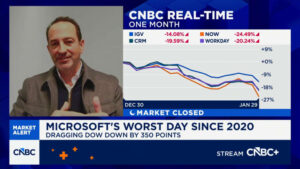Times are hard, money is tight, and taxes are rising. The UK’s tax burden is higher than at any time since World War II, we’re told — on track to reach 37.7% of GDP, according to the Office for Budget Responsibility.
Income tax thresholds have been frozen until 2028, ensnaring huge numbers of people in higher-rate tax bands through ‘fiscal drag’, as their earnings climb faster than tax thresholds.
Capital Gains Tax receipts will soar, as our annual Capital Gains Tax tax-free allowance is cut from £12,570 to £6,000 — and then again to £3,000 in 2024.
The double-taxation scandal that is dividend taxation — something that didn’t even exist a few years back — will drag in more money from us all, too. The tax-free allowance, which was £5,000 when dividend taxation was first introduced in 2016, will fall from £2,000 to £1,000, and then fall again to £500 from April 2024.
More than ever, we as investors need to keep our wits about us if we are to meet our investment goals — wealth accumulation, income generation, a comfortable retirement, or whatever.
So here, in the spirit of that sentiment, are three resolutions for the new tax year.
Shelter wealth in an ISA, not a brokerage account or investment account
I know, I know. Everywhere you look, personal finance commentators are urging us all to maximise our ISA contributions, paying in whatever spare cash we can afford — ideally to the full £20,000 allowance. You would be forgiven for imagining that by now, everyone knew this, and regularly complied.
But the fact remains that not only do significant numbers of people not do this, or even attempt to do it, but they also happily hold investments in ordinary brokerage accounts, or as non-ISA mutual funds with investment fund providers.
Why? Inertia, perhaps. Laziness. Indifference. A lack of awareness that Stocks and Share ISAs exist? I don’t know.
But if this is you, then resolve to do something different. ISAs mean that you don’t pay income tax on dividends, and that you don’t pay Capital Gains Tax on realised profits.
And with the Capital Gain Tax tax-free allowance dropping to £3,000 from April 2024, and the Dividend Tax tax-free allowance dropping to £500 from the same date, both are valuable concessions.
Pensions: tax-free gains, tax-free dividends — and tax rebates
ISAs aren’t the only mass-market tax shelter, though. So are private pensions such as SIPPs, stakeholder pensions, and so forth.
Anyone can take out a SIPP or stakeholder, and so benefit from seeing their pension-sheltered earnings and profits grow free from income tax and Capital Gains Tax.
Better still, pension contributions — under present tax law — still generously benefit from tax rebates at your highest marginal rate. Every year, there’s a regular scare about this valuable benefit being withdrawn or scaled back, but so far it hasn’t happened.
So just because you already have an employer’s pension, don’t imagine that you can’t also have a SIPP or stakeholder pension – an investment, like an ISA, where you make the investment choices, and empower your future. Even modest savings will grow over time, while reducing your tax bill in the meantime.
Bed & ISA, Bed & SIPP
Hopefully, you took advantage of the last few months of the annual Capital Gains Tax tax-free allowance of £12,570 to crystallise gains and move the proceeds into tax shelters such as ISAs or SIPPs. This year, as I say, the tax-free allowance is £6,000 — and next year, it’s £3,000.
Most investment platforms offer facilities such as ‘Bed and ISA’, or ‘Bed and SIPP’, where non-ISA investments are liquidated and the proceeds moved into tax shelters.
£12,570 — as the Capital Gains Tax tax-free allowance used to be — allowed quite a bit of scope for selling-and-sheltering, but this year’s £6,000 allowance and next year’s £3,000 allowance are a lot more restrictive. You’ll be forced to transfer more slowly, to avoid triggering a taxable capital gain. Taking action now, this year, makes sense.
The bottom line
Investing is good. You know that; I know that. Through investing, we make our futures more secure, building a buffer against adversity, an income stream, and — in the longer term — a more comfortable retirement.
Post-pandemic, and post-Truss, public finances are stretched. The Chancellor had to act, and taxes had to rise. Again: you know that; I know that.
But those same taxes can prove damaging for your wealth, robbing you of realised gains, and income.
So don’t delay — secure your prosperity today.
This post was originally published on Motley Fool







